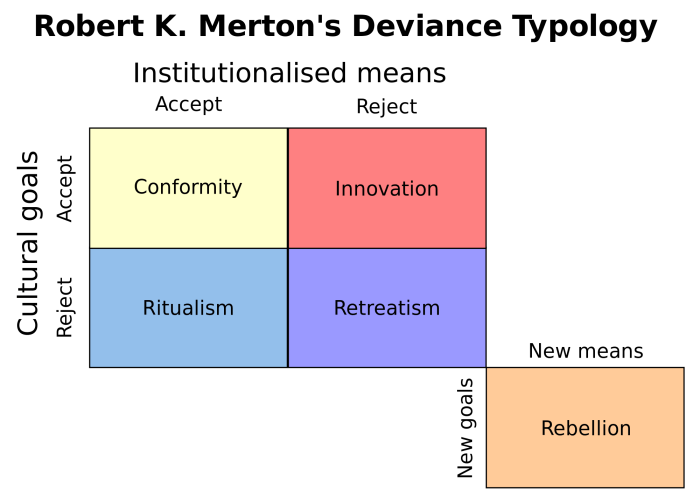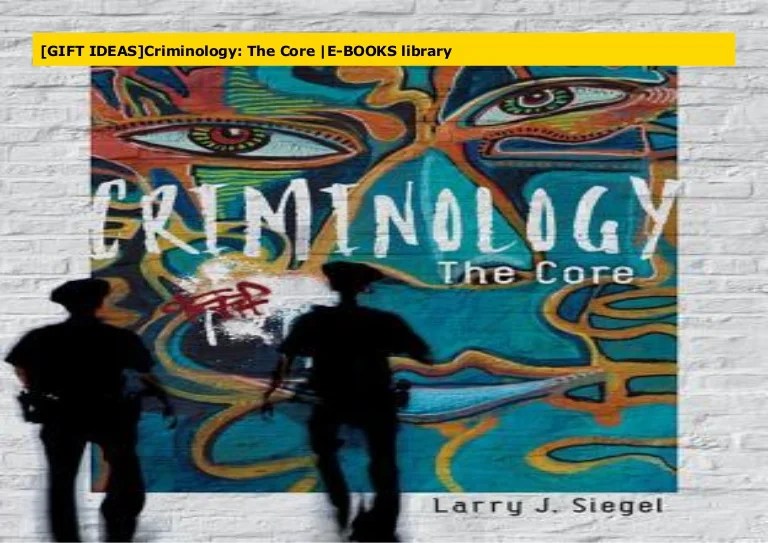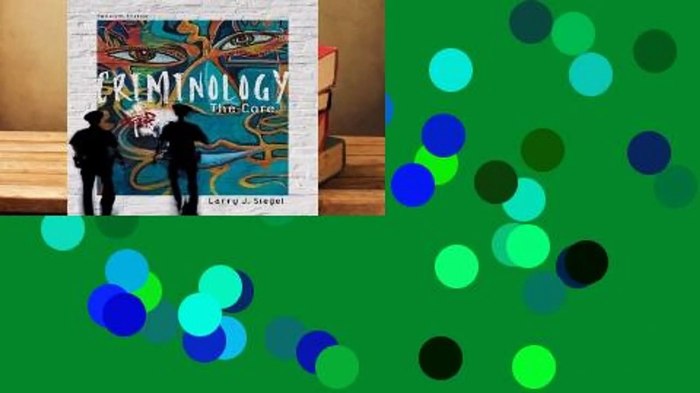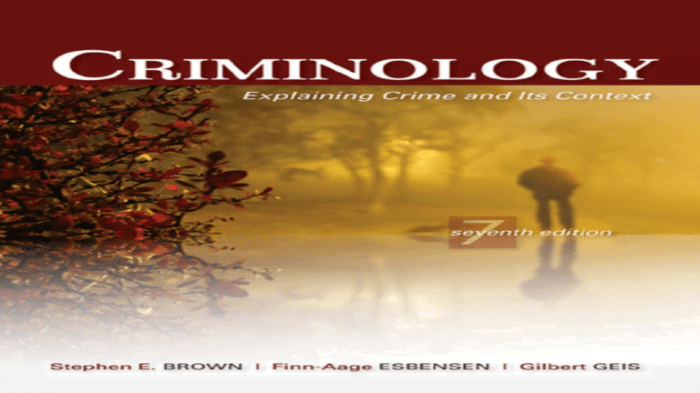Criminology a sociological understanding 7th edition – Criminology: A Sociological Understanding, 7th Edition, embarks on an enthralling journey into the complex world of crime and its sociological underpinnings. This comprehensive text unveils the intricate tapestry of theoretical perspectives, measurement methodologies, and crime typologies that shape our understanding of criminal behavior.
Through its engaging narrative, this book delves into the historical evolution of criminology, exploring the major theoretical frameworks that have sought to explain the causes and consequences of crime. From biological and psychological theories to sociological and environmental perspectives, the text provides a balanced analysis of their strengths and limitations.
Theoretical Perspectives in Criminology

Criminology, the study of crime and criminal behavior, employs various theoretical perspectives to explain the causes and patterns of crime. These perspectives can be broadly categorized into four main groups: biological, psychological, sociological, and environmental theories.
Biological theories focus on the role of genetics and other biological factors in criminal behavior. Psychological theories emphasize the influence of mental processes, personality traits, and cognitive factors. Sociological theories explore the impact of social structures, cultural norms, and social interactions on crime.
Environmental theories consider the influence of physical and social environments on criminal behavior.
Each perspective offers unique insights into the complex nature of crime. Biological theories suggest that genetic predispositions and physiological factors can contribute to criminal behavior. Psychological theories highlight the role of cognitive distortions, emotional dysregulation, and mental disorders in crime.
Sociological theories emphasize the importance of social inequality, social disorganization, and social learning in shaping criminal behavior. Environmental theories explore how factors such as poverty, neighborhood characteristics, and exposure to violence can increase the risk of criminal behavior.
Understanding the strengths and weaknesses of each perspective is crucial for a comprehensive understanding of criminology. Biological theories provide valuable insights into the biological underpinnings of crime, but they can oversimplify the complex interplay of biological and environmental factors. Psychological theories offer valuable insights into the mental processes and cognitive factors associated with crime, but they can sometimes overlook the role of social and environmental factors.
Sociological theories provide a comprehensive framework for understanding the social and cultural contexts of crime, but they can sometimes struggle to account for individual differences in criminal behavior. Environmental theories highlight the importance of physical and social environments in shaping criminal behavior, but they can sometimes overemphasize the role of external factors at the expense of individual agency.
Crime Measurement and Statistics

Measuring and understanding crime is essential for developing effective crime prevention and control strategies. Criminologists use various methods to measure crime, including official crime statistics, victimization surveys, and self-report surveys.
Official crime statistics are collected by law enforcement agencies and include crimes reported to the police. These statistics provide valuable information about the types and frequency of crimes reported to the police. However, they can underestimate the true extent of crime, as many crimes go unreported due to fear of retaliation, lack of trust in the police, or other reasons.
Victimization surveys involve interviewing a representative sample of the population about their experiences with crime. These surveys provide information about both reported and unreported crimes, giving a more comprehensive picture of the true extent of crime. However, victimization surveys can be affected by recall bias, as respondents may not accurately remember all crimes they have experienced.
Self-report surveys involve asking individuals to report on their own criminal behavior. These surveys can provide valuable insights into the prevalence of hidden crimes, such as drug use or petty theft. However, self-report surveys can be affected by social desirability bias, as respondents may underreport their involvement in criminal behavior due to fear of social disapproval.
Each method of crime measurement has its strengths and limitations. Official crime statistics provide a reliable measure of crimes reported to the police, but they underestimate the true extent of crime. Victimization surveys provide a more comprehensive picture of crime, but they can be affected by recall bias.
Self-report surveys can provide valuable insights into hidden crimes, but they can be affected by social desirability bias.
Criminologists must carefully consider the limitations of each method when using crime statistics to inform policy and research. By combining different methods of crime measurement, criminologists can gain a more comprehensive understanding of the true extent and nature of crime.
Questions Often Asked: Criminology A Sociological Understanding 7th Edition
What is the primary focus of Criminology: A Sociological Understanding?
Criminology: A Sociological Understanding examines crime from a sociological perspective, emphasizing the social and environmental factors that influence criminal behavior.
How does the book approach the measurement of crime?
The book provides a comprehensive overview of different crime measurement methods, including official crime statistics, victimization surveys, and self-report surveys, discussing their strengths and limitations.
What are the key theoretical perspectives explored in the book?
The book delves into the major theoretical perspectives in criminology, including biological, psychological, sociological, and environmental theories, analyzing their power and empirical support.

